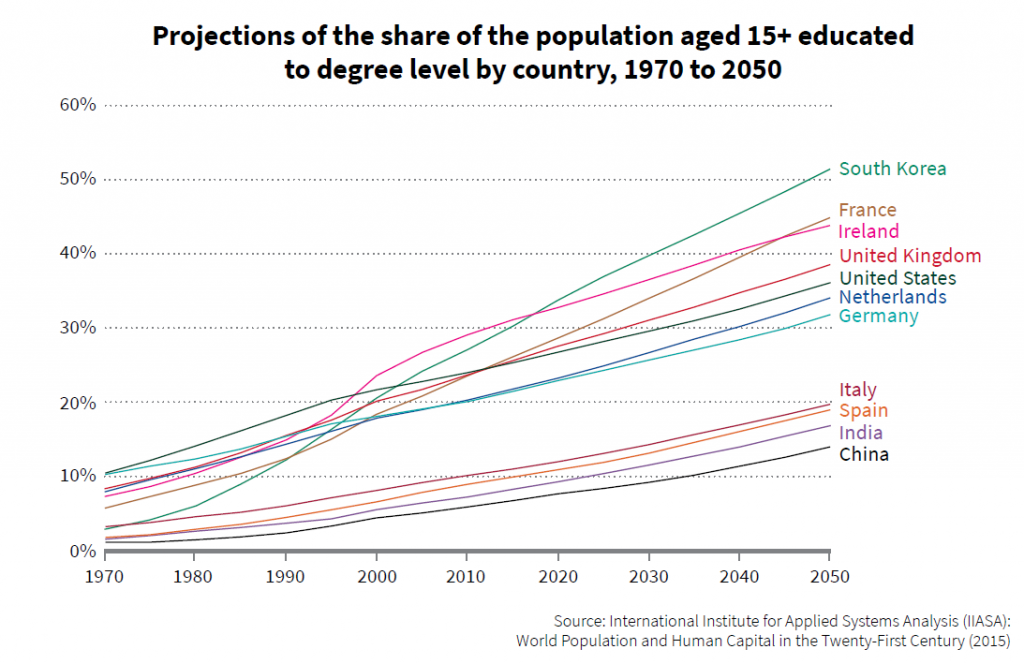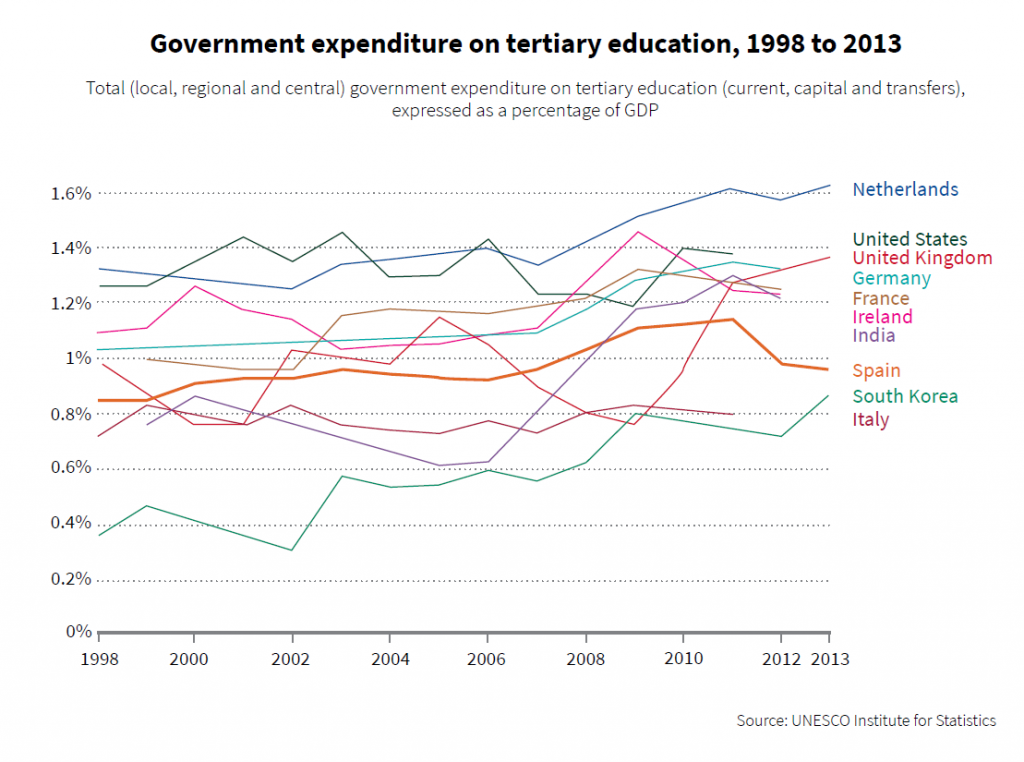Most staff and students at UK universities opposed Brexit in part because of the historic tendency of universities to break down national boundaries.
From the medieval concept of a travelling community of scholars to today’s Erasmus+ and Turing schemes, higher education has often been at its best when it has been at its most international.
The general view inside universities is that national boundaries are necessary evils but should be as low as possible. Around 25,000 staff in the 24 Russell Group institutions come from the EU. Cross-border research projects are more influential than ones undertaken in a single country. The UK tertiary sector has educated 57 serving world leaders.
Yet arguments about Brexit and UK universities were often overdone. The ties between UK universities and much of the world beyond the EU were deeper even before Brexit than the ties with many EU states.
This was in part because English universities could only charge EU undergraduates £9,250 before Brexit, whereas they could charge any figure they liked to other overseas students. So it was worth spending more money recruiting from outside the EU and you could still make a healthy surplus to reinvest in other activities, principally research.
Moreover, the British (or perhaps English) exceptionalism that motivated many Brexiteers has long been evident in our higher education system. For example, the UK’s excessive hierarchy of higher education institutions looks odd from many European capitals, even though the German system in particular has been shifting somewhat closer to a hierarchy.
The ‘Bologna process’ of higher education harmonisation across Europe proved more painful outside the UK than within it because it was an attempt to drag the European model of higher education closer to the existing British one. Shifting to three or four-year degrees and Master’s courses that typically last as little as one year was a big change that led to protests in some places, but was already the norm in the UK.
One remaining oddity of the British system is the tendency for a huge proportion of UK students to move away from home to study. Indeed, excessive hierarchy and high levels of residency are linked: when your universities are similar in quality, there is less need to study away from home. But in terms of prestige, Oxbridge and the ancient Scottish universities historically carried all before them. So unless you happened to live in one of a very few places, you had to travel to reach them.
Then, as the best ever observer of UK higher education, Martin Trow, observed, we built a mass system on an elite model. That has pros and cons, one of which is the huge expense – hence the shift to cost-sharing, with loan-based finance from 1990 onwards. In recent years, Scotland has managed to avoid tuition fees for Scottish students, but it has been unable to match England’s abolition of student number controls, so is less able to satisfy demand.
When Covid hit, the UK higher education model looked under huge threat.
Would the international students that prop up all the loss-making activities, such as teaching home students and conducting research, continue to arrive? Could the relatively expensive model of UK higher education persist as learning moved online? Would our main competitors for international students deal better with Covid than the UK? Last summer, the Institute for Fiscal Studies was clear that many UK universities stood on the brink of financial disaster.

It hasn’t happened. The international students kept enrolling in the main and UK school leavers turned up in record numbers as other options, like interesting gap years, ceased to be an option and the number of higher-level apprenticeships fell.
It is true students are less happy than they were and they are more likely to say they are not receiving good value for money. In England, this has led to loud demands for tuition fee refunds as well as rent rebates but such calls were not felt to the same degree in university systems that receive more direct support from the state. If you do not pay a tuition fee, you cannot reasonably ask for a refund.
Even in England, tuition fee refunds for higher education students were generally rejected, except where clear promises about students’ learning outcomes were made and broken. In part, this was because taxpayers pick up more than half of the cost, as unpaid student loans are written off by the Treasury. So it is not clear who should have been getting a refund even if there had been the money available to pay out.
Rent rebates were typically offered, both by universities for their own halls of residence and from big student accommodation providers but were less common than many people suppose. Even at the height of the crisis, most students opted to remain in their term-time residence.
European countries have seen their education system similarly disrupted to a greater or lesser degree. Germany famously kept many elements of traditional exams for school leavers in 2020, prompting questions from lockdown sceptics in other countries that made bigger changes, including the UK and US. France cancelled the baccalauréat (known as ‘the bac’), which had not occurred even during the two world wars, opting for continuous assessment instead, ensuring a record number of top grades. In 2021, a comparable system was used again, which may herald big further changes as Emmanuel Macron has long wanted to reform the bac.
In higher education, French students have been as frustrated as British ones by the cancellation of much in-person learning and there has been a similarly negative impact on mental health and student finances, given part-time jobs are harder to come by. Just as there were louder demands for financial recompense from students in fee-based England than in ‘free’ systems, there were more tensions between controlling governments and institutions in less autonomous systems, such as Germany.
Many people have predicted Covid and other changes mean the end of the traditional model of higher education. It has even been said that, within a few years, universities ‘will be just one category of knowledge services provider in a world where learning costs almost nothing’.

I suspect their future is actually a lot rosier than this: the traditional UK higher education model of three years of intensive study in a new city looks somewhat more attractive now that people know the alternative is staying at home with mum and dad watching stuff online and missing out on a social life, rather than absorbing the life of a new part of the country.
Overall, UK universities have coped well in the crisis. None has fallen over financially. Australasian competitors closed their borders to international students while ours stayed open.
But change is still afoot: for example, demand from EU students is down 56%, which will be terrible for campus diversity.
Yet perhaps the oddest feature of this summer’s exam results day was policymakers telling school leavers to look at vocational alternatives to higher education when apprenticeship numbers are hugely down, as employers have had to focus on surviving more than training the next generation.
When the alternatives are not there, then the people who can tend to vote with their feet by enrolling in higher education.
- Nick Hillman is director of the Higher Education Policy Institute
Warning: Illegal string offset 'link_id' in /mnt/storage/stage/www/wp-includes/bookmark.php on line 357
Notice: Trying to get property 'link_id' of non-object in /mnt/storage/stage/www/wp-includes/bookmark.php on line 37







